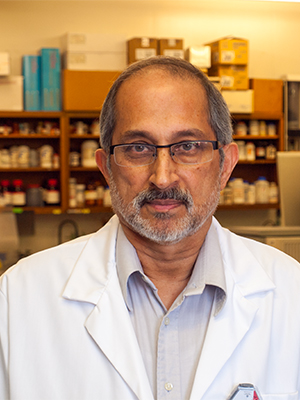Understanding the Folate Connection to Autism
By Office of the President | Apr 22, 2025

Edward V. Quadros, Ph.D.
For more than three decades, Edward V. Quadros, Ph.D., Hematology/Oncology Division Research Professor in the Department of Medicine, has been chasing the answer to a question that did not make sense: Why do some children with autism show signs of folate deficiency in the brain—even when their blood tests look normal?
Thanks to recent clinical breakthroughs and a growing chorus of collaborators, the scientific puzzle is now making national headlines as Dr. Quadros’s work is reshaping how we understand neurodevelopmental disorders—and opening new possibilities for treatment.
Cerebral folate deficiency (CFD) is a disorder where folate, a B vitamin essential to brain development, does not make it into the brain—even though blood levels appear normal. In many cases, the culprit is an autoimmune response where the body produces antibodies that block folate receptor alpha (FR⍺), the key molecule responsible for transporting folate into the brain. Without access to this critical nutrient, developing brains are disadvantaged.
That’s where the Folate Receptor Antibody Test (FRAT) comes in—a simple blood test developed by Dr. Quadros that detects whether a child has these folate-blocking autoantibodies. Supported by a SUNY Research Foundation TAF grant, FRAT is a powerful tool for diagnosis. Now, when a child tests positive, there is a promising next step: Leucovorin, a well-known folinic acid used in cancer treatment. Unlike regular folate, Leucovorin takes an alternate pathway into the brain, bypassing the blocked receptor and restoring much-needed access.
Dr. Quadros’s research has been validated and expanded by leading scientists globally, including Vincent Ramaekers, M.D. (University of Liège, Belgium), Jean-Louis Guéant, M.D., DSc. (University Hospital of Nancy, France), and Richard Frye, M.D., Ph.D. (University of Arizona). Their clinical work has demonstrated that leucovorin treatment can improve speech and communication in children with autism who test positive for FR⍺ autoantibodies. In one trial, one in three children showed measurable improvement. Some families have also seen remarkable changes—for example, a child speaking their first words just days into treatment.
These powerful moments have started to catch national attention, with stories appearing on CBS News, in the London Daily News, and the New York Post. Dr. Quadros, the face behind the headlines, continues his steady and determined work, unraveling the molecular clues that made these breakthroughs possible—and visible to the world.
Though Leucovorin is still considered an off-label treatment for autism, challenges remain. Because it’s a generic drug, there’s little financial incentive for large-scale investment. Federal Drug Administration (FDA) trials needed to formalize its use are expensive and underfunded. Momentum is building with organizations like Every Cure that are stepping up to amplify the promise of repurposed drugs like Leucovorin—and to honor researchers like Dr. Quadros and Dr. Frye for the foundation they have built.
But this is about more than just one treatment. It is a window into possibilities when molecular diagnostics meet personalized medicine. Dr. Quadros’s work opens doors to a deeper understanding of how immune function, inflammation, and genetics shape early brain development. It is a reminder that asking the right question—even if no one else is asking it—can lead to breakthroughs that change lives.
Congratulations to Dr. Quadros, whose work is a powerful example of why World Autism Month—recognized globally each April—matters. It brings long-overdue attention to complex, often misunderstood conditions and the researchers working to solve them.
Tags: Department of Medicine